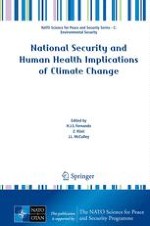2012 | OriginalPaper | Chapter
23. Assessing Local Water Conflicts: Understanding the Links Between Water, Marginalisation and Climate Change
Author : Lukas Ruettinger
Published in: National Security and Human Health Implications of Climate Change
Publisher: Springer Netherlands
Activate our intelligent search to find suitable subject content or patents.
Select sections of text to find matching patents with Artificial Intelligence. powered by
Select sections of text to find additional relevant content using AI-assisted search. powered by
